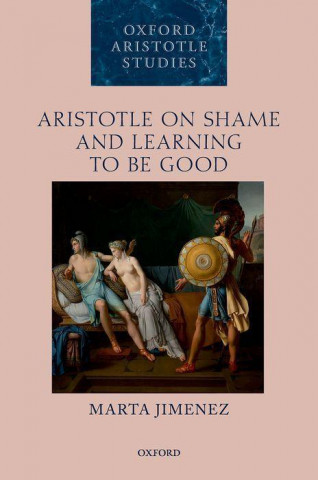
Kód: 33337204
Aristotle on Shame and Learning to Be Good
Autor Jimenez, Marta (Associate Professor, Associate Professor, Emory University)
This book presents a novel interpretation of Aristotle's account of how shame instils virtue, and defends its philosophical import. Despite shame's bad reputation as a potential obstacle to the development of moral autonomy, shame ... celý popis
- Jazyk:
 Angličtina
Angličtina - Vazba: Pevná
- Počet stran: 224
Nakladatelství: Oxford University Press, 2020
- Více informací o knize

Mohlo by se vám také líbit
Darujte tuto knihu ještě dnes
- Objednejte knihu a zvolte Zaslat jako dárek.
- Obratem obdržíte darovací poukaz na knihu, který můžete ihned předat obdarovanému.
- Knihu zašleme na adresu obdarovaného, o nic se nestaráte.
Více informací o knize Aristotle on Shame and Learning to Be Good
Nákupem získáte 265 bodů
 Anotace knihy
Anotace knihy
This book presents a novel interpretation of Aristotle's account of how shame instils virtue, and defends its philosophical import. Despite shame's bad reputation as a potential obstacle to the development of moral autonomy, shame is for Aristotle the proto-virtue of those learning to be good, since it is the emotion that equips them with the seeds of virtue. Other emotions such as friendliness, righteous indignation, emulation, hope, and even spiritedness may play important roles on the road to virtue. However, shame is the only one that Aristotle repeatedly associates with moral progress. The reason is that shame can move young agents to perform good actions and avoid bad ones in ways that appropriately resemble not only the external behavior but also the orientation and receptivity to moral value characteristic of virtuous people. By turning their attention to considerations about the perceived nobility and praiseworthiness of their own actions and character, shame places young people in the path to becoming good. Although they are not yet virtuous, learners with a sense of shame can appreciate the value of the noble and guide their actions by a true interest in doing the right thing. Shame, thus, enables learners to perform virtuous actions in the right way before they have practical wisdom or stable dispositions of character. This book solves a long-debated problem concerning Aristotle's notion of habituation by showing that shame provides motivational continuity between the actions of the learners and the virtuous dispositions that they will eventually acquire.
 Parametry knihy
Parametry knihy
2651 Kč
- Plný název: Aristotle on Shame and Learning to Be Good
- Autor: Jimenez, Marta (Associate Professor, Associate Professor, Emory University)
- Jazyk:
 Angličtina
Angličtina - Vazba: Pevná
- Počet stran: 224
- EAN: 9780198829683
- ISBN: 019882968X
- ID: 33337204
- Nakladatelství: Oxford University Press
- Hmotnost: 506 g
- Rozměry: 241 × 165 × 19 mm
- Datum vydání: 31. December 2020
Oblíbené z jiného soudku
-

Dune
262 Kč -

Haunting Adeline
617 Kč -

Berserk Deluxe Volume 2
1093 Kč -

White Nights
78 Kč -

Powerless
276 Kč -

Atomic Habits
339 Kč -

Dune Messiah
178 Kč -

Berserk Deluxe Volume 3
1138 Kč -

One Day
276 Kč -

Berserk Deluxe Volume 1
1112 Kč -

Iron Flame
352 Kč -

Surrounded by Idiots
256 Kč -

Harry Potter and the Prisoner of Azkaban (Minalima Edition)
688 Kč -

Gravity Falls Journal 3
440 Kč -

Heaven Official's Blessing: Tian Guan Ci Fu (Novel) Vol. 1
440 Kč -

The Creative Act
586 Kč -

Dune
213 Kč -

Hunting Adeline
625 Kč -

A Little Life
257 Kč -

Children of Dune
174 Kč -

Heaven Official's Blessing: Tian Guan Ci Fu (Novel) Vol. 2
441 Kč -

Bungo Stray Dogs, Vol. 8 (light novel)
367 Kč -

Percy Jackson and the Olympians 5 Book Paperback Boxed Set
953 Kč -

Solo Leveling, Vol. 1
444 Kč -

The Prisoner's Throne
229 Kč -

Court of Thorns and Roses
254 Kč -

Cry Baby Coloring Book
255 Kč -

Fourth Wing
420 Kč -

Icebreaker
199 Kč -

Berserk Deluxe Volume 6
1086 Kč -

Avatar, the Last Airbender: The Kyoshi Novels (Box Set)
676 Kč -

The 48 Laws of Power
602 Kč -

House of Leaves
405 Kč -

Twisted Lies
214 Kč -

Dune Messiah
277 Kč -

No Longer Human
339 Kč -

48 Laws Of Power
471 Kč -

Twisted Games
214 Kč -

Caraval Paperback Boxed Set
905 Kč -

Solo Leveling, Vol. 2
448 Kč -

Open Circuits
861 Kč -

Berserk Deluxe Volume 5
1115 Kč -

Heaven Official's Blessing: Tian Guan Ci Fu (Novel) Vol. 3
441 Kč -

Berserk Deluxe Volume 4
1165 Kč -

Court of Mist and Fury
238 Kč -

SOLO LEVELING V08
449 Kč -

English File Upper Intermediate Multipack A (4th)
495 Kč -

CHAINSAW MAN V14
249 Kč -

Before the Coffee Gets Cold
209 Kč
Osobní odběr Praha, Brno a 12903 dalších
Copyright ©2008-24 nejlevnejsi-knihy.cz Všechna práva vyhrazenaSoukromíCookies





 Vrácení do měsíce
Vrácení do měsíce 571 999 099 (8-15.30h)
571 999 099 (8-15.30h)